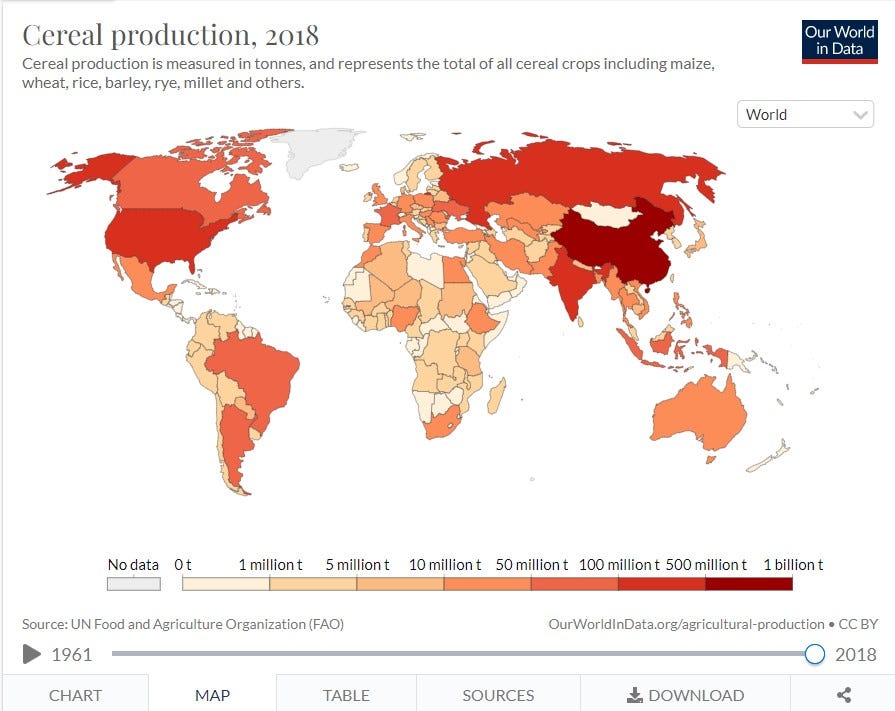Issue #28 2022-03-07
Can 'fake' pork be kosher, the food fraud arms race and the lab that was too "good"
Welcome to The Rotten Apple, an inside view of food integrity for professionals, policy-makers and purveyors. Subscribe for weekly insights, latest news and emerging trends in food safety, food authenticity and sustainable supply chains.
Supply chain data visualised (beautifully)
Our global arms race and the Food Authenticity Network
The lab that was too good to be true
Can plant-based “pork” ever be halal or kosher?
Food fraud incidents and horizon scanning updates from the past week
Hi,
Food supply chain news is dominated by the impacts of the Ukraine war this week. I have nothing useful to add. But I have shared links to some of the best commentary in this week’s issue, plus a very cool global data visualisation tool on global food production (it even has stats for lower volume commodities like plantain and leeks)
Also this week, a short example from the food fraud arms race, plus a testing lab that was too “good” and a question about the halal and kosher status of ‘fake’ pork.
As always, this issue ends with a list of food fraud incidents and horizon scanning updates from the past week.
Please share this newsletter with your network and reply with any feedback.
Thanks for reading!
Karen
P.S. If you want to know why I created this newsletter, read this.

Supply Chains
World Food Supply Chain News
Ukraine is an important global food exporter and a major supplier of fertiliser to Europe. No surprise then that international food and ag news is dominated now by the conflict and its impacts to markets. This is a topic best left to journalists with more resources than me.
Here are some articles that capture the global (including Asian) situation.
Food Prices Spike, Governments Step to Protect Supplies - Bloomberg
Russia-Ukraine conflict has a limited impact on China's food prices (cnbc.com)
What the War in Ukraine Means for US Agriculture - Modern Farmer
This is so cool
Our World in Data is a set of beautiful, interactive world maps that show, among other things, world-wide production of food crops, food prices and per capita kilocalorie figures.
Warning: it’s super addictive. I went there to check Ukraine’s importance as a global fertilizer exporter, and ended up, 30 minutes later, knowing that Thailand produces five times more molasses than Australia (might have got a little distracted!)
Created by Oxford University scholars and now operated by a not-for-profit called Global Change Data Lab, the data maps are really worth a look.
Find it here: https://ourworldindata.org/explorers/global-food
Food Fraud
The Food Authenticity Network and Our Global Arms Race Against Food Fraud
The fight against food fraud has been likened to an arms race, with the good guys (us!) trying to stay one step ahead of the bad guys (the food fraud perpetrators).
“For example, people had been committing food fraud by injecting chicken breasts with hydrolyzed proteins to increase their size and water retention. Once we developed DNA methods to detect this, the fraudsters changed their approach, or they only used chicken DNA to obscure this practice.”
So said leaders of the Food Authenticity Network in a recent interview by News-Medical.
Born from the horsemeat scandal of 2013 and its now famous Elliott Review, the Food Authenticity Network is a United Kingdom government initiative that aims to fight food fraud.
The Food Authenticity Network provides information about food authenticity, food fraud prevention and testing methods, with a focus on educating food businesses and laboratories on authenticity testing methods and listing laboratory “Centres of Excellence”. They publish a range of tools, guides and blog posts for the international food industry, with a UK-focus.
Members of the Food Authenticity Network can comment on articles and benefit from its global networking and horizon scanning activities. It is free to join and open to members from all countries.
The Food Industry Intelligence Network is a separate organisation that supports the Food Authenticity Network. The Food Industry Intelligence Network is an industry consortium, a group of competitor food companies that share food fraud information anonymously with each other.
Hooray for anonymous data-sharing! Data-sharing about food fraud issues was one of the recommendations of the Elliott review, which recognised that food companies usually operate in a secretive way for commercial reasons. This is one of those – good – times where governments and industry listened to the recommendations of experts and acted to build systems that would make the world a better place. 😊
By the way, if you haven’t read the Elliott Review and its preceding interim report, I recommend you check it out. It’s how incident investigations and reviews should be done, with clear language, lots of listening and practical recommendations.
Sources and links
Food Authenticity Network: https://www.foodauthenticity.global/
Food Industry Intelligence Network: https://www.fiin.co.uk/about-fiin
Arms race quote source:
https://www.news-medical.net/news/20220111/International-approaches-to-tackling-food-fraud.aspx
The Elliott Review: https://www.gov.uk/government/publications/elliott-review-into-the-integrity-and-assurance-of-food-supply-networks-final-report
Ethical Supply Chains
The lab that was too “good”
If you want to (legally) sell marijuana in the USA you have to get it tested it for potency and for residues of pesticides, heavy metals and microbial contamination.
Marijuana producers in Arizona found a lab that gave them great results. Every time.
Potency: excellent.
Salmonella: not detected.
Heavy metals: absent.
Batch after batch after batch, the test results were just what the companies needed. What a great lab.
Unfortunately, the results were too good to be true. The lab operators were using a potency testing technique that produced inflated results. Equipment for testing pesticides, solvents, heavy metals, and microorganisms were not properly calibrated. Product tested by the lab was linked to a recall for Salmonella contamination.
The lab’s PR firm released a statement attributing its failures to the fact that “the industry as a whole simply wasn’t prepared to meet immediate demands of a consumer market”. What a crappy excuse for bad science.
Worse still, the regulators had already found multiple violations at the lab in 2020 and issued a corrective action plan. Which had not been actioned. More than one year later, in November last year, the state of Arizona told the lab they intended to revoke the laboratory’s certification.
The lab’s certification wasn’t revoked. Instead, the lab has agreed to (finally) implement the corrective action plan from 2020 and submit to a 3rd party audit. Oh, and pay a $468,000 fine. Yup, that’s almost half a million dollars. But they got to keep their certification.
The lab was accused of being “chummy” with its customers in the marijuana industry. Which isn’t really surprising… we see good, collaborative relationships between food companies and their labs all the time in the food industry. What was surprising was a statement from the company that implied they had at one time had a commercial conflict of interest by benefiting directly from the sales of product that they tested.
A spokesperson said “the laboratory owner no longer has a familial or financial relationship with… a dispensary or related medical marijuana business entity..”
Wow.
Future Foods
Can ‘fake’ pork ever be kosher?
Impossible Pork: It’s not pork, it’s made of plants. It contains no ingredients that are haram or terefah (disallowed) in Muslim or Jewish traditions.
So some industry insiders are baffled that the most prestigious American kosher and halal certifying agencies refused to certify it.
The ingredients themselves are free from animal by-products and are permitted in both Jewish and Muslim dietary traditions. The certification was denied on the grounds that Impossible Pork resembles pig meat.
Source: https://thecounter.org/certify-impossible-pork-kosher-halal-jewish-muslim-dietary-traditions/
Food Fraud Incidents and Horizon Scanning
Food fraud incidents added to Food Fraud Risk Information Database in the past week
Ground nut oil and gingelly oil (a type of sesame oil) were being diluted with palm oil and rice bran oil respectively, in a fraudulent operation - India
A soft drink manufacturer was ordered to cease trading after it was found to be using erasable ink for expiry dates on its glass bottles. The manufacturer had previously been ordered to use indelible ink for expiry dates. Media reports allege that the erasable ink was being used so that the glass bottles could be recycled easily.
At least one person has died and eleven people are sick from champagne bottles that contained MDMA (the party drug ecstasy). One news source alleged that the affected products were (presumably) counterfeit Moet & Chandon champagne that was purchased online. A similar incident was detected in bottles imported to Australia in 2018.
https://webgate.ec.europa.eu/rasff-window/screen/notification/533748 and https://cyprus-mail.com/2022/02/25/health-ministry-warns-of-champagne-containing-dangerous-drug/ and https://www.dailymail.co.uk/news/article-6609713/Border-police-discover-96-litres-ecstasy-hidden-inside-champagne-bottles.html
Labelling machines, counterfeit labels, expired foods and re-labelled foods were discovered by authorities who traced a food fraud criminal operation. The criminals were repackaging and relabelling large quantities of expired foods including snacks, fruit juices and soft drinks - Italy
https://www.salute.gov.it/portale/news/p3_2_1_2_1.jsp?lingua=italiano&menu=notizie&p=nas&id=2342
Food fraud horizon scanning (other updates to the Food Fraud Risk Information Database in the past week)
The price of crude palm oil is the highest it has ever been. This is due to labour shortages in key growing areas plus the rising cost of agricultural chemicals including fertilisers. The price is 64% higher than in the previous year and expected to remain high until mid-2022 - global 12/02/2022
Thanks for being here,
See you next week!




